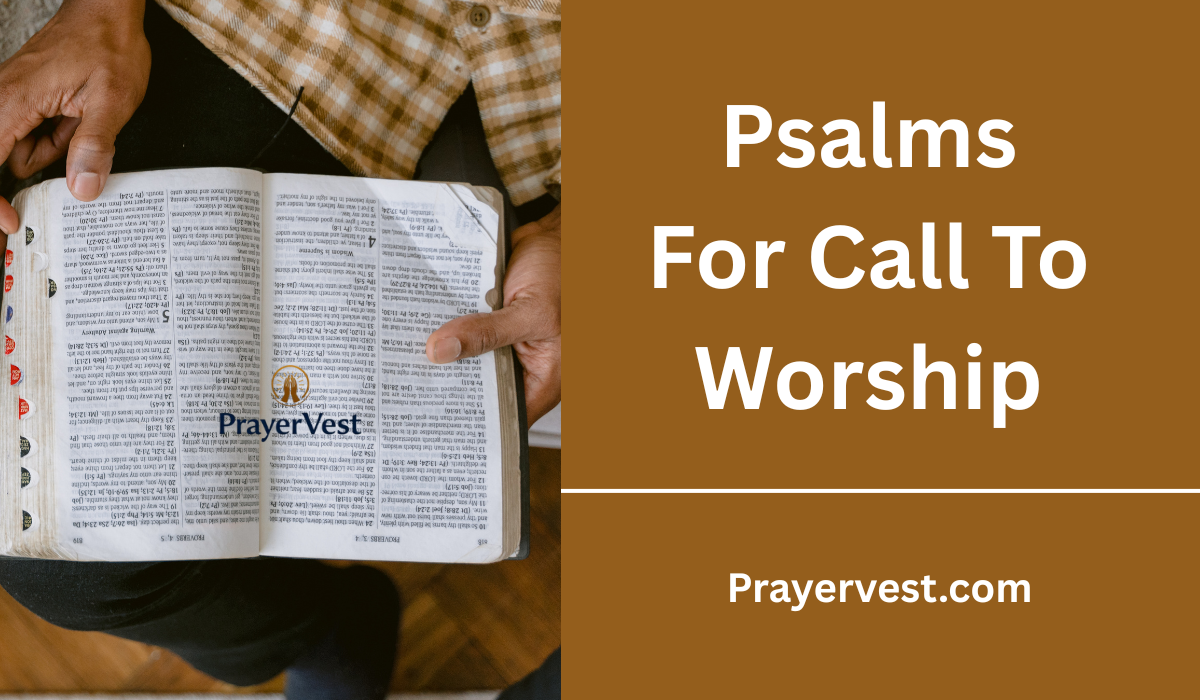Throughout Judeo-Christian history, the Book of Psalms has long been the beating heart of devotion. Every human emotion—joy, sadness, repentance, hope, and awe before God—is reflected in this holy compilation of prayers, praises, laments, and declarations.
The Psalms for call to worship serve a variety of purposes in spiritual life, but among these is their potent call to worship, which establishes the atmosphere for awe, solidarity, and divine encounter. They call on the Christian community to raise their voices in unison, acknowledge the majesty of God, and react in wonder and thankfulness. These age-old words, whether sung, uttered, or contemplated, prepare the soul to meet the Most High.
A call to worship is an invitation to experience the living God, not only a liturgical ritual. In this regard, the Psalms shine, providing language that uplifts the soul and synchronizes our souls with timeless realities.
The Psalms lead the congregation from distraction to devotion with everything from exultant exclamations like “Make a joyful noise unto the Lord!” to modest requests like “Come, let us bow down in worship.” They serve as a reminder that we should worship God’s sanctity, grandeur, and kindness rather than ourselves. The Psalms offer a spiritual doorway that allows the worshipper to pass from the mundane into the sacred in this fashion.


The Psalms have been used to frame the liturgy, designate sacred time, and call worshippers in Catholic, Orthodox, and Protestant traditions. They are enduring partners in both private and public prayer because of their poetic beauty and divine inspiration. Investigating potent Psalms for the call to worship reveals more than simply verses; it also reveals sacred invitations—divine calls to approach, raise our gazes, and declare that only the Lord is deserving of all glory. Instead of just urging us to start worshipping, these Psalms inspire us to honor God with every breath.
50 Uplifting Psalms For Call To Worship(2026)
1. Psalm 95:6
“Come, let us bow down in worship, let us kneel before the Lord our Maker.”
This Psalm is a direct invitation to corporate worship, calling God’s people to humbly acknowledge Him as Creator. Bowing and kneeling are postures of surrender and reverence, symbolizing that worship is not merely emotional expression but a physical and spiritual acknowledgment of God’s lordship. This verse reminds us that true worship is anchored in humility—recognizing who we are in the presence of who God is. It sets the tone for any gathering of believers, redirecting attention from self to the sovereign Creator of all.
Reflection
Worship is not about atmosphere or emotion—it’s about encounter. When we come before the Lord, our posture matters. This Psalm invites us into a holy space where reverence replaces routine, and awe replaces apathy. In a world that often encourages pride and self-expression, this verse gently calls us to kneel—to lay everything down at the feet of the One who made us. Let this act of kneeling be more than symbolic; let it represent a heart that fully surrenders in worship. In that space, transformation begins.
2. Psalm 100:4
“Enter his gates with thanksgiving and his courts with praise; give thanks to him and praise his name.”
Psalm 100:4 is a foundational call to worship that teaches the posture we are to adopt when approaching God’s presence—one of gratitude and praise. The imagery of “gates” and “courts” evokes the temple setting, where worshippers would move closer to God’s presence as they entered. Thanksgiving is not a prelude; it is the doorway to deeper communion. This verse shows that worship begins not with need, but with recognition of who God is and what He has already done.
Reflection
Gratitude clears the way for worship. When we come before God with thankful hearts, we’re not just reciting a list of blessings—we’re aligning ourselves with truth. Praise lifts us above our problems and into God’s perspective. Even when life feels chaotic, entering His courts with thanksgiving centers our hearts and reminds us of His faithfulness. Start every worship moment by reflecting on what God has already done. That remembrance fuels adoration, deepens intimacy, and turns any place into holy ground.
3. Psalm 29:2
“Ascribe to the Lord the glory due his name; worship the Lord in the splendor of his holiness.”
This verse is a command and a declaration. To “ascribe” glory is to recognize and declare God’s greatness—to give Him what He is rightfully due. Worship is not about offering God something He lacks, but about acknowledging what is already true about Him. The “splendor of His holiness” highlights the majestic and set-apart nature of God. This verse calls worshippers to approach with reverence, not familiarity—to see God’s holiness as beautiful, awe-inspiring, and worthy of our deepest devotion.
Reflection
Worship isn’t about how we feel—it’s about who God is. When we ascribe to the Lord the glory due His name, we’re not flattering Him; we’re responding rightly to His infinite worth. His holiness sets Him apart from everything we know, and yet in His mercy, He invites us to draw near. That is the wonder of worship: the Holy One allows intimacy. So when we sing, speak, or kneel before Him, let it be with a heart that trembles and delights in the beauty of His holiness.
4. Psalm 34:3
“Glorify the Lord with me; let us exalt his name together.”
This Psalm, written by David, is an open invitation to corporate worship. It emphasizes that glorifying God is not a solitary act but one enriched by community. Worship becomes more powerful when voices unite, when hearts align in purpose, and when God’s name is exalted together. This verse underscores the communal nature of faith—a shared celebration of God’s goodness that draws believers closer to one another and to Him.
Reflection
There’s something powerful about worshiping together. In a culture that often values personal spirituality over communal connection, Psalm 34:3 reminds us that faith is not meant to be walked alone. When we glorify the Lord *together*, we amplify His praise and reinforce our shared dependence on Him. Whether in a church, small group, or even two gathered in prayer, God dwells amid united praise. Invite others into worship—not just with music, but with your life—and experience the beauty of glorifying Him as one body.
5. Psalm 96:9
“Worship the Lord in the splendor of his holiness; tremble before him, all the earth.”
Psalm 96:9 is a global call to reverent worship. The word “tremble” reflects the awe and fear that come when humanity stands in the presence of a holy and sovereign God. This verse invites not only Israel but all the earth into holy reverence. It reminds us that worship is not merely celebration—it is also surrender. Holiness, not hype, is the foundation of true worship.
Reflection
Worship that transforms begins in awe. When we recognize the weight of God’s glory and the depth of His holiness, our hearts can’t help but tremble. This trembling is not terror—it’s reverence. It’s the moment our soul bows low and acknowledges: “God is here.” Whether in song or silence, let us cultivate worship that flows from deep wonder, recognizing that we stand on sacred ground every time we enter into His presence.
6. Psalm 147:1
“Praise the Lord. How good it is to sing praises to our God, how pleasant and fitting to praise him!”
This verse joyfully affirms the rightness of praising God. Worship isn’t just a command—it is a delight. It’s both good and fitting, meaning it aligns with the created order. When we sing praises to God, we’re doing what we were made to do. This Psalm shows that worship is not a burden, but a beautiful response to the goodness of God.
Reflection
There are few things more healing than praise. In a world that constantly demands our attention and exhausts our energy, worship reorients our souls. Singing to God isn’t only an act of reverence; it’s a reset for the heart. When we open our mouths in praise, heaven invades the ordinary. So lift your voice—even when weary—and find joy rising in the melody of worship.
7. Psalm 150:6
“Let everything that has breath praise the Lord. Praise the Lord.”
The final verse in the Book of Psalms is an emphatic command and celebration. All of creation, simply by having breath, is called to praise God. This verse removes barriers and qualifications—if you are breathing, you are summoned to worship. It’s the ultimate inclusivity of praise: all are welcome to glorify the One who gives life.
Reflection
Praise is not reserved for the perfect—it’s the natural response of the living. When we inhale, we are taking in a gift from God. And with every exhale, we have the opportunity to return that gift in praise. Whether in song, prayer, or silent awe, let every breath you take become a rhythm of worship. If you’re alive, you’re invited.
8. Psalm 33:3
“Sing to him a new song; play skillfully, and shout for joy.”
This Psalm emphasizes creativity and excellence in worship. Singing a “new song” doesn’t only mean writing new lyrics—it reflects a fresh heart and renewed perspective. “Playing skillfully” suggests that worship involves preparation and intentionality. God deserves not just our emotion, but our best. This verse shows that worship is dynamic, joyful, and full of life.
Reflection
Worship is more than repetition—it’s revelation. A “new song” can arise from a fresh encounter with God or a deeper understanding of His love. Don’t let your worship grow stale. Bring God your creativity, your excellence, your joy. Practice your gifts, refine your art, and lift your voice—not for perfection, but as a passionate offering to the One who is always worthy of more than yesterday’s praise.
9. Psalm 40:3
“He put a new song in my mouth, a hymn of praise to our God. Many will see and fear the Lord and put their trust in him.”
Here, David reflects on personal deliverance, acknowledging that God’s rescue results in a new expression of worship. The “new song” becomes not only a personal testimony but a witness to others. Worship, then, is both response and evangelism. When we praise God authentically, others are drawn to trust in Him.
Reflection
Your worship has power beyond yourself. The new song God gives you in your healing, breakthrough, or restoration can become a light for others still walking in darkness. Don’t hide your praise. Sing it boldly. Testify through song. Every lyric of your story points to the faithfulness of God, and through your worship, others will be invited to believe.
10. Psalm 66:4
“All the earth bows down to you; they sing praise to you, they sing the praises of your name.”
This verse captures the cosmic scale of worship. Creation itself bows down in honor of the Creator. The earth’s response is one of singing and surrender—a universal chorus that transcends human voices. It highlights that God is not only the God of Israel, but the God of all the earth.
Reflection
Worship is woven into the fabric of creation. From the crashing waves to the rustling leaves, all things proclaim the glory of God. When we worship, we join an eternal and global symphony. You are not alone in your praise—heaven and earth, angels and saints, all rise in worship to the same King. Let your voice be one more note in that sacred sound.
11. Psalm 63:4
“I will praise you as long as I live, and in your name I will lift up my hands.”
This verse reveals a deeply personal commitment to a lifetime of worship. Lifting hands in God’s name is a physical act of surrender and honor, often signifying dependence, thanksgiving, and praise. David’s words show that worship isn’t just for the mountaintop moments—it’s a continual offering of life itself to the One who sustains it.
Reflection
Worship is a lifelong journey. Whether in youth or old age, in triumph or trial, we are called to a daily rhythm of praise. Lifting our hands is not merely symbolic—it is surrender, openness, and adoration in action. Let this verse be your vow: that no matter the season, your praise will endure, and your life will be a banner of His name lifted high.
12. Psalm 118:24
“This is the day the Lord has made; let us rejoice and be glad in it.”
This verse is both a declaration and a decision. Every day is God-given, and this Psalm calls us to meet it with joy. Worship is not reserved for ideal circumstances—it begins with recognizing the gift of the present moment. Rejoicing becomes an act of faith, especially on days when joy feels distant.
Reflection
Each sunrise is an invitation to worship. Whether the skies are clear or clouded, this day—like every day—was handcrafted by God. Rejoicing is not about ignoring pain, but about choosing trust. Worship with gladness today, not because every situation is perfect, but because the God who made the day is. Let your worship begin with gratitude that you are here, and that He is near.
13. Psalm 145:3
“Great is the Lord and most worthy of praise; his greatness no one can fathom.”
This verse anchors worship in God’s immeasurable greatness. The infinite nature of God means He is always worthy of more praise than we can comprehend or give. This Psalm shifts focus from what we receive in worship to the One who is always worthy, regardless of our feelings or circumstances.
Reflection
True worship begins where our understanding ends. We may never fully grasp the greatness of God—but that’s the point. His majesty invites our wonder, and our praise becomes a humble echo of His glory. When words fall short, let your heart rise. Worship Him not because you fully understand Him, but because He is infinitely worthy.
14. Psalm 9:1
“I will give thanks to you, Lord, with all my heart; I will tell of all your wonderful deeds.”
David here vows to worship God with his whole heart and to make God’s works known. Worship is not just vertical; it becomes horizontal testimony. The Psalmist’s gratitude leads to proclamation—because true worship overflows and inspires others.
Reflection
When you recall what God has done, gratitude wells up, and worship flows freely. Let your heart not be divided in praise—give it all. And don’t keep the story to yourself. When you speak of God’s wonders, your worship becomes a witness. Your gratitude might ignite someone else’s faith. Let your life be a loud and living thank-you.
15. Psalm 134:2
“Lift up your hands in the sanctuary and praise the Lord.”
This short command emphasizes physical expression in the context of gathered worship. Lifting hands in the sanctuary is a sign of reverence, readiness, and surrender. The verse reminds worshippers that God desires our whole being—body, soul, and spirit—in the act of praise.
Reflection
Sometimes, the posture of your body helps awaken the posture of your heart. When we lift our hands, we physically align ourselves with the act of giving and receiving. It’s a visual statement of surrender, openness, and praise. Don’t be afraid to lift your hands—you’re reaching toward the One who has always reached for you.
16. Psalm 86:12
“I will praise you, Lord my God, with all my heart; I will glorify your name forever.”
Here, the Psalmist speaks from deep devotion and intentionality. Worship isn’t half-hearted or momentary—it is full and forever. To glorify God’s name is to declare His character as good, holy, and faithful in every circumstance, across every season.
Reflection
Praise with your whole heart, not just your lips. God isn’t seeking performance—He’s after a heart that genuinely delights in Him. Make worship your lifelong anthem. Let every breath and every choice glorify the One whose name is worthy of forever praise.
17. Psalm 71:8
“My mouth is filled with your praise, declaring your splendor all day long.”
This verse reflects a life saturated with worship. Praise is not confined to a single moment or gathering—it is continuous. Declaring God’s splendor throughout the day makes worship a lifestyle, not a scheduled event.
Reflection
What fills your mouth most—complaints or praise? This Psalm challenges us to speak of God’s goodness throughout the day. Let worship be the soundtrack of your life, not just your Sunday. When your mouth is full of praise, your mind is renewed, your joy is restored, and your witness is strengthened.
18. Psalm 47:1
“Clap your hands, all you nations; shout to God with cries of joy.”
This call to worship is exuberant and inclusive, inviting all nations into joyful expression. Clapping and shouting are outward demonstrations of inward joy. Worship in this context is celebratory and communal—an overflow of hearts rejoicing in the greatness of God.
Reflection
Worship isn’t always quiet reflection—it can be loud with joy. Clapping and shouting are biblical responses to the glory of God. Don’t hold back your celebration. Worship with passion. Whether you’re in a sanctuary or in your kitchen, let joyful praise erupt. God is worthy of your loudest hallelujah.
19. Psalm 108:3
“I will praise you, Lord, among the nations; I will sing of you among the peoples.”
This verse expresses a desire to worship God publicly and globally. It breaks the boundaries of private devotion and declares that praise belongs in the public square. Worship is both intimate and evangelistic—it tells the world about a glorious God.
Reflection
Your worship isn’t just for you—it’s for the world to see. Don’t hide your praise. Whether it’s your voice, your service, or your story, let it shine beyond the church walls. When you lift God’s name boldly, your worship becomes a beacon, drawing others to the light of His love.
20. Psalm 149:1
“Praise the Lord. Sing to the Lord a new song, his praise in the assembly of his faithful people.”
This verse combines fresh worship with corporate expression. The “new song” signifies ongoing revelation and gratitude, while the “assembly” points to community. Worship is meant to evolve and expand, especially when shared among believers.
Reflection
Don’t wait for the perfect setting to praise. Every gathering of faithful people is a stage for God’s glory. Sing new songs—not just musically, but from a renewed spirit. Every day you walk with God, you have a reason to sing something new. Gather with others and let that song rise in unity and power.
21. Psalm 89:15
“Blessed are those who have learned to acclaim you, who walk in the light of your presence, Lord.”
This verse links worship to blessing and intimacy with God. To “acclaim” the Lord means to joyfully declare His greatness. Those who make praise a lifestyle walk continually in the illumination of God’s presence, experiencing His guidance, favor, and peace.
Reflection
Praise is learned and lived. The more you proclaim God’s goodness, the more you dwell in His light. Worship aligns your heart with His presence and opens your eyes to His activity in your life. If you’re feeling distant from God, start praising—because walking in the light begins with lifting your voice in worship.
22. Psalm 132:7
“Let us go to his dwelling place, let us worship at his footstool, saying…”
This verse captures the reverence and communal urgency to seek God’s presence. Referring to the temple as His “dwelling place” and “footstool” reveals the awe and humility of true worship. It is a call to come together and bow low before the Holy One.
Reflection
Worship is a journey—a movement toward God’s presence with a heart full of expectancy. It’s not about the building but about being where God dwells. Make worship a priority destination in your life. Bow your heart at His footstool, and you will discover that His presence is more than worth the pursuit.
23. Psalm 5:7
“But I, by your great love, can come into your house; in reverence I bow down toward your holy temple.”
This verse reveals that access to worship comes not by our merit but by God’s love. David enters God’s presence with reverence, not entitlement. Worship here is both privilege and response—rooted in humility and awe.
Reflection
Every time you enter into worship, remember: it’s grace that allows you in. God’s house is open not because you’ve earned it, but because His love welcomes you. Let reverence guide your approach. Bow not just your knees but your heart, and worship with the wonder of one who knows they are undeservedly loved.
24. Psalm 30:4
“Sing the praises of the Lord, you his faithful people; praise his holy name.”
This verse is a direct command to God’s people, encouraging collective singing and recognition of His holiness. It’s not just a call to worship—it’s a call to remember the One we worship: holy, faithful, and worthy of endless praise.
Reflection
When God gathers His people, He longs to hear them sing. Your song matters—not because it’s perfect, but because it’s personal. Join your voice with others, and praise the holy name of the One who has been faithful through every season. Your worship unites with heaven when you lift it in faith and love.
25. Psalm 84:10
“Better is one day in your courts than a thousand elsewhere; I would rather be a doorkeeper in the house of my God than dwell in the tents of the wicked.”
This verse exalts the value of God’s presence above all else. Even the lowest position in the house of the Lord is better than the highest comfort apart from Him. Worship becomes a declaration of what truly matters—being close to God.
Reflection
There is no comparison to being in God’s presence. One moment of true worship is more fulfilling than a thousand moments of worldly gain. Make it your desire not just to visit God’s house but to dwell in it—even at the door—because there, you find everything your soul needs.
26. Psalm 143:6
“I spread out my hands to you; I thirst for you like a parched land.”
This verse expresses desperate longing for God. Spreading out hands symbolizes surrender and openness, while thirst portrays deep spiritual hunger. Worship here is not based on circumstances—it’s born out of deep need for divine presence.
Reflection
True worship flows from longing. When your soul feels dry, don’t run from God—reach out to Him. Stretch out your hands in surrender and trust that He will satisfy your spiritual thirst. Let your hunger for God fuel your worship and draw you closer to His living water.
27. Psalm 107:22
“Let them sacrifice thank offerings and tell of his works with songs of joy.”
This verse connects worship to thanksgiving and testimony. Thank offerings were given in response to God’s goodness. Worship involves remembering and declaring His mighty works, turning gratitude into joyful song.
Reflection
Every praise is a thank offering. When you sing of what God has done, you are building a legacy of faith. Don’t keep your testimony silent. Let your songs tell the story of His grace and goodness. In your praise, others will hear and be encouraged to trust the God who has done great things.
28. Psalm 92:1
“It is good to praise the Lord and make music to your name, O Most High.”
This verse affirms the beauty and rightness of musical worship. It’s not just permissible—it’s good. Worshipping through music honors God and lifts the soul. It reminds us that song is a sacred and joyful offering.
Reflection
Music is a divine gift that speaks when words fall short. Use your voice, your instrument, your song—even your silence turned upward—as a melody to the Most High. It’s not about performance; it’s about presence. Sing because He is worthy. Sing because it is good.
29. Psalm 116:17
“I will sacrifice a thank offering to you and call on the name of the Lord.”
This verse shows worship as a response to deliverance and answered prayer. A “thank offering” symbolizes recognition of God’s hand in our lives. Calling on His name is both worship and dependence.
Reflection
Every answered prayer deserves a return of praise. Has God rescued, healed, or provided for you? Then worship. Your thank offering might be a song, a prayer, a gift, or a testimony—but let it rise. Let your worship say: “Lord, I see what You’ve done, and I glorify Your name.”
30. Psalm 135:3
“Praise the Lord, for the Lord is good; sing praise to his name, for that is pleasant.”
This verse focuses on the goodness of God and the delight of praise. Worship isn’t a duty—it’s a joy. Singing to the Lord is pleasant, not only to Him but to our souls. Worship, then, becomes both a gift we give and a grace we receive.
Reflection
Worship is a beautiful exchange. As you lift your voice in praise, peace and joy return to your heart. Praise the Lord not just because He is good—but because it is good *for you*. Let your song rise with gladness, and you will find that worship is the sweetest medicine for a weary soul.
31. Psalm 7:17
“I will give thanks to the Lord because of his righteousness; I will sing the praises of the name of the Lord Most High.”
This verse grounds worship in God’s righteousness—His moral perfection and justice. The Psalmist’s praise is not based on circumstances but on the character of God. Singing to the “Most High” is a declaration of His supreme authority and goodness.
Reflection
Worship grounded in who God is will never run dry. His righteousness never changes—even when the world does. Let your praise rise not only when things go right, but simply because God is right. When we lift His name, we anchor our hearts in truth and trust.
32. Psalm 149:3
“Let them praise his name with dancing and make music to him with timbrel and harp.”
This verse invites worship through movement and music. It celebrates joyful expression and creativity in praising God. Worship isn’t limited to voice—it includes the whole body, reflecting the exuberance and freedom found in God’s presence.
Reflection
Worship is meant to be alive—filled with joy, rhythm, and freedom. Don’t be afraid to move, to dance, to celebrate in the presence of the Lord. Your whole being was made to glorify Him. Let your worship be uninhibited, creative, and full of life, for He delights in your delight.
33. Psalm 57:9
“I will praise you, Lord, among the nations; I will sing of you among the peoples.”
David declares his intent to worship God publicly and universally. Even amid personal crisis, he focuses outward—committing to make God’s name known across nations. Worship becomes a global testimony of God’s worth.
Reflection
Your worship is a witness. When you lift your voice, especially in trials, the world sees where your hope lies. Let your praise be loud enough to cross borders—spoken, sung, or shared. You never know whose heart your worship may reach.
34. Psalm 71:23
“My lips will shout for joy when I sing praise to you—I whom you have delivered.”
This verse springs from personal deliverance. Praise here is not quiet or restrained—it is a joyful shout. Worship is the natural overflow of a grateful heart that has experienced God’s saving power.
Reflection
Never forget what God has delivered you from. Let the memory of His mercy be the melody of your praise. You don’t need perfect vocals—just a full heart. Shout your joy, sing your thanks, and let your worship echo with freedom.
35. Psalm 26:8
“Lord, I love the house where you live, the place where your glory dwells.”
This verse expresses a deep love for God’s presence and the place where He manifests His glory. The “house of the Lord” represents a space of encounter and transformation. Worship flows from a heart that delights in being near God.
Reflection
To truly worship is to long for God’s presence. It’s not about brick and mortar but about where His glory dwells. Cultivate a heart that says, “I love being where You are, Lord.” That love will turn any space into sacred ground.
36. Psalm 33:1
“Sing joyfully to the Lord, you righteous; it is fitting for the upright to praise him.”
This verse links righteousness with joy-filled praise. It declares that worship is not just appropriate—it is natural for those who walk with God. Singing joyfully reflects the alignment between a pure heart and a worthy God.
Reflection
Worship is a reflection of relationship. If you know the goodness of God, let joy rise. Your righteousness is not your own—it’s a gift, and praise is your response. Don’t hold back your joy. It’s fitting, it’s right, and it’s beautiful to God.
37. Psalm 9:11
“Sing the praises of the Lord, enthroned in Zion; proclaim among the nations what he has done.”
This verse ties worship to proclamation. To sing praises is to lift up the name of the enthroned King, and to declare His deeds to the world. Worship is always both upward and outward.
Reflection
When you praise, you proclaim. Your worship isn’t just sound—it’s a story. Sing about what God has done and let the world hear about your King. Every note and every lyric can become an invitation for others to come and see His glory.
38. Psalm 135:1
“Praise the Lord. Praise the name of the Lord; praise him, you servants of the Lord.”
This verse is a direct, repeated call to praise. It is aimed at God’s servants—those who live to glorify Him. Worship is their joyful duty, their highest honor, and their life’s purpose.
Reflection
If you serve the Lord, you’re called to praise. It’s not optional—it’s your identity. When you speak His name in reverence and joy, you fulfill your highest calling. Praise Him not just for what He does, but for who He is. You are His, and that alone is reason to worship.
39. Psalm 68:4
“Sing to God, sing in praise of his name, extol him who rides on the clouds; rejoice before him—his name is the Lord.”
This verse exalts God as the majestic, sovereign Lord over all creation. Worship here is awe-filled and celebratory. Singing is both a declaration of His power and an expression of personal rejoicing.
Reflection
Worship is your invitation to joy in the presence of a powerful God. He rides on the clouds—high and mighty—yet invites you to sing before Him. Marvel at His greatness, rejoice in His nearness, and let your song be filled with holy awe.
40. Psalm 147:7
“Sing to the Lord with grateful praise; make music to our God on the harp.”
This verse connects gratitude with song and encourages instrumental worship. Making music to God is a tangible way to express thanksgiving and devotion. Praise is not limited to words—it expands into every creative expression.
Reflection
Gratitude is the heartbeat of worship. Whether through voice or instrument, pour out your thanks. Let every note, every chord, every beat be a testimony of God’s faithfulness. Praise Him with all you have—He is worthy of your best and your full heart.
41. Psalm 145:4
“One generation commends your works to another; they tell of your mighty acts.”
This verse emphasizes generational worship—a continuous passing down of God’s greatness through testimony and praise. Worship is not only a personal act but also a legacy we build through our words and lives.
Reflection
Your praise today shapes the worship of tomorrow. Every story of God’s faithfulness you share becomes a seed of faith in someone else’s life. Whether parent to child or friend to friend, let your worship speak. Let it echo through generations as a living testimony of God’s mighty acts.
42. Psalm 92:1
“It is good to praise the Lord and make music to your name, O Most High.”
This verse affirms that worship is inherently good and pleasing. Making music to God’s name is a fitting response to His majesty and a joyful act of reverence.
Reflection
There is no higher purpose than praising the Lord—it’s not just right, it’s good. Music has the power to lift the soul and magnify the divine. Let every song you sing be a celebration of His goodness and a joyful offering to the One who reigns on high.
43. Psalm 34:3
“Glorify the Lord with me; let us exalt his name together.”
This call to collective worship invites others to join in glorifying God. It emphasizes the unity and power of corporate praise, where voices blend to magnify one name.
Reflection
Worship is even more powerful when shared. When we lift our voices together, we remind one another of who God is and what He’s done. Don’t worship alone—invite others in. Exalt His name with friends, family, and the Church, and watch how the atmosphere shifts.
44. Psalm 29:2
“Ascribe to the Lord the glory due his name; worship the Lord in the splendor of his holiness.”
This verse commands worship that honors God’s holy nature. It urges us to give Him the full glory He deserves, recognizing His beauty, majesty, and set-apartness.
Reflection
God is not common—He is holy. And holy worship is our response to His majesty. When we ascribe glory to His name, we recognize He is above all. Worship in awe. Worship with reverence. Let His holiness inspire deep adoration and joyful surrender.
45. Psalm 63:3-4
“Because your love is better than life, my lips will glorify you. I will praise you as long as I live.”
This intimate verse reveals the heart of a worshiper captivated by God’s love. His love is not only life-giving—it surpasses life itself. Praise becomes an eternal commitment.
Reflection
When you truly experience God’s love, worship is the only response. His love brings purpose, joy, and peace greater than anything life can offer. Let your lips glorify Him daily, and let your life be a living psalm of praise as long as you breathe.
46. Psalm 66:4
“All the earth bows down to you; they sing praise to you, they sing the praises of your name.”
This verse envisions global, universal worship. All creation acknowledges God’s sovereignty through song and reverent submission.
Reflection
Worship is not just local—it’s cosmic. Heaven and earth sing in harmony. When you praise, you join a global, even heavenly choir. Your song aligns with stars, rivers, and nations declaring His glory. Join in. Your voice matters in the chorus of creation.
47. Psalm 84:1–2
“How lovely is your dwelling place, Lord Almighty! My soul yearns, even faints, for the courts of the Lord.”
This verse expresses deep longing for God’s presence. Worship flows from desire, from a soul that hungers for the nearness of the Almighty.
Reflection
True worship begins with desire. When your soul yearns for God, you’ve already begun to worship. Let your heart run toward His courts. The deeper your longing, the sweeter your praise. Chase after His presence—it’s the loveliest place of all.
48. Psalm 96:4
“For great is the Lord and most worthy of praise; he is to be feared above all gods.”
This verse exalts the Lord’s supremacy. His greatness demands worship, and His worthiness far exceeds any other being or idol.
Reflection
Why worship? Because God is *worthy*. Let no other thing take His place in your heart. When you revere Him above all, praise flows naturally. Lift His name higher than your problems, possessions, or ambitions—for He alone is great.
49. Psalm 149:6
“May the praise of God be in their mouths and a double-edged sword in their hands.”
This verse connects worship with spiritual warfare. Praise is not passive—it’s powerful, even combative. It equips the faithful with strength and authority.
Reflection
Your praise is a weapon. When you declare God’s truth, darkness flees. Let the praises of God fill your mouth—not only to exalt Him but to push back the enemy. Worship with confidence, knowing every song sharpens your spirit and stirs heaven’s army.
50. Psalm 103:1
“Praise the Lord, my soul; all my inmost being, praise his holy name.”
This final verse is a personal call to deep, wholehearted worship. It is an inward command for every part of oneself to bless the Lord and honor His holy name.
Reflection
Worship begins within. Speak to your soul—remind it to praise. Don’t hold anything back. Give your inmost being, your secret heart, your full affection to the Holy One. When your worship flows from your depths, it touches God’s heart profoundly.
Conclusion
As we’ve seen, the Psalms are holy portals that lead worshippers to a greater understanding of God’s majesty, kindness, and closeness. These inspired verses arouse the heart and direct the soul toward the One deserving of all praise, whether they are used in a liturgical context, a modern service, or private devotion. They do more than just start a service; they bring us into sync with heaven and serve as a reminder that worship is about being present rather than about performing. The Psalms are the ageless voice that joyfully, powerfully, and truthfully proclaims the divine call to worship.
Let these Psalms serve as more than introductory statements. Allow them to become ingrained in your heart, serving as the foundation for every gathering in awe, every prayer in honesty, and every song in adoration. These verses may awaken your soul to the glory of the Lord, excite your spirit, and hush your distractions, whether you are leading a congregation or are just trying to find God’s presence in your quiet time. Because everything else flows from the proper foundation—a heart that is completely turned toward God—when we start in worship.






